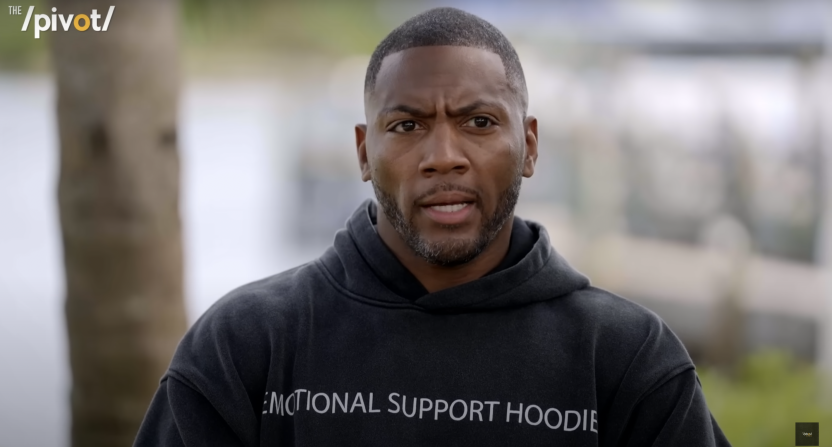Last month, there was uncertainty about Ryan Clark’s future at ESPN following the Super Bowl. In a social media video, Clark explained that his contract ended and negotiations weren’t successful. But after leaving the door open for a return and negotiating his own contract, Clark finds himself back with the Worldwide Leader for the foreseeable future.
On his podcast, The Pivot, Clark recently discussed the challenges of negotiating his own contract. He acknowledged that while many athletes now take control of their negotiations, he wasn’t prepared for this initially. He admitted he had to learn the business side of things quickly, even though it wasn’t something he’d focused on before.
“You can only negotiate from a platform as high as you’ve built it,” he said. “Like Stephen A. (Smith), how you always say put your meat on the table, Stephen A. could walk in and put his meat on the table right now because he’s Stephen A. Shannon Sharpe did the same thing last offseason. Pat McAfee do what the hell he wants.
“Like, I’m gonna be honest, I respect it. Pat McAfee chose, ‘I’mma give up football, and I’mma start this thing with my homeboys; and I’mma bet on me. And on betting on me, I got one deal. Then, on betting on me, I understood what the platform was, so I went there. And now, with that platform, knowing who you work with and who you work for, if I want to call out an executive (Norby Williamson), I’m gonna call him out. Oh, and next week, I’m gonna take pictures with another ’cause I ain’t got no boss.’ Like, he said it.”
Clark aspires to the sense of significance Smith and McAfee feel at ESPN. Clark wants to walk in knowing the entire network thrives partly because of his contributions. On the negotiation front, what Clark said he enjoyed most was the initial resistance. He relished that people weren’t eager to talk to him or his agent, David Mulugheta.
“We were standing on me,” Clark explained. “Like, David, in negotiating my money, he ain’t got nobody else that’s doing TV. He ain’t gotta be your friend. I don’t sign up for this business to have friends. Ain’t nobody gonna advocate for me like I’m gonna advocate for me. And you know what else? I keep score. That’s what I miss about football is: we don’t have a scoreboard.
“If I’m on the show, if I do First Take on Friday, Get Up on Monday, or whatever it is, I’m counting how many social pieces ESPN — my employer — puts out for everybody else on TV with me. So I can tell you, ‘Hey, go look at Mondays when I’m on Get Up and First Take. Go look at Fridays when I’m on Get Up and First Take.’ It’s not Shannon; it’s not Stephen A.; it’s not Dan (Orlovsky). And no disrespect to anybody — it’s me; you’re posting me. Your people are making that decision because that’s what IO does. Check the numbers when I do it. Check the numbers when I’m hosting Get Up. Like, check all that, I show up. And you’re telling me not to compare myself to other people, but no. If you treat him like that, treat me how I’m supposed to be treated. And so, I think that was always my thing. And that was the thing I was gonna stand on.”
Amidst his conversation with co-hosts Fred Taylor and Channing Crowder, Clark discussed his approach to his new contract negotiations. He acknowledged that the business had transformed him, fostering a competitive drive that felt like constantly trying to overpower his colleagues, akin to Kobe Bryant’s fierce “Black Mamba” persona.
However, Clark confessed a longing for a shift. He yearned for the joy of collaboration, preferring to “hit turnaround jumpers and smile” rather than constantly feeling the pressure to dominate. He expressed a desire to move away from the mentality of everyone being an adversary and, instead, facilitate discussions and build connections. This shift, he explained, stemmed from the pressure of feeling like he constantly had to deliver exceptional results – like “scoring 60” – to secure his value.
Ultimately, Clark emphasized his goal in the negotiations: to become indispensable to ESPN, ensuring The Pivot Podcast remained untouchable.
“Because we’re changing culture, and we’re creating a place for athletes to tell their own story to control their own narrative,” Clark continued. “We have changed things culturally. When people walk up to us, nothing makes me feel better than when they can point to specific episodes that have changed their lives in some way. And you want me to give that up and that ownership to be an employee? And I’m gonna be good enough to make you realize you can’t stop me, and you still want me. And, like, that happened.”
